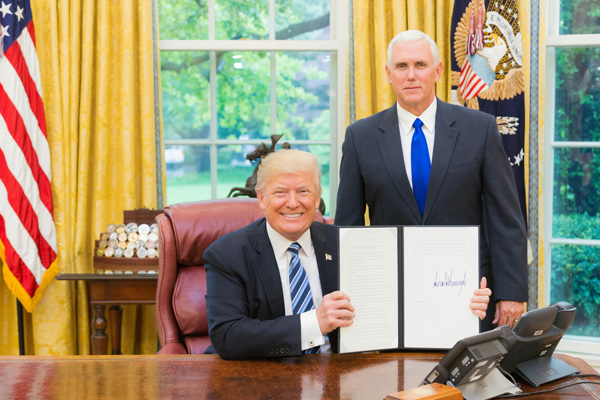Dollar's dominance shaken as tariffs spark global economic turmoil

[Photo Credit to Unsplash]
The U.S. dollar, once regarded as a safe-haven currency, is rapidly losing global credibility as President Donald Trump’s escalating tariff war drives economic uncertainty and financial instability.
In just one week, the dollar suffered a substantial decline, plummeting to a decade-low against the Swiss franc and hitting a three-year low against the euro.
This marks a dramatic reversal for a currency that has long been viewed as the world’s most dependable store of value.
Markets that once traditionally relied on U.S. financial leadership are now reacting with alarm.
The sharpest surge in Treasury borrowing costs since 1982 reflects how offshore investors are pulling out of U.S. assets.
Swap spreads have shifted drastically, signaling heightened risk.
Investors now demand higher returns to lend to the U.S. than they do for Italy, Spain, or Greece.
This erosion in confidence coincides with the Trump administration doubling down on a protectionist trade agenda.
Heavy tariffs on imports from both allies and adversaries have triggered global retaliation, with China leading the charge.
China announced a hike in tariffs on U.S. goods from 84% to 125%, further escalating the trade war.
European Union officials are flying to Washington in an effort to defuse tensions and avoid further economic fallout.
As of Friday, the Dow rose 1.56%, the S&P 500 gained 1.8%, and the Nasdaq climbed 2%.
However these gains followed a tumultuous week of losses, including a 1,000-point drop in the Dow on Thursday.
Gold surged $3,200 an ounce, reflecting investor anxiety.
Consumer sentiment in the U.S. dropped to its lowest point since 1981.
The University of Michigan’s index fell to 50.8, marking the fourth straight monthly decline.
Americans are increasingly concerned about rising prices, layoffs, and weaker personal finances.
More than twice as many consumers now anticipate unemployment compared to just five months ago.
Small business owners are also sounding alarms.
Many have halted innovation, raised prices, or cut back inventory due to increased costs from tariffs.
Others report shrinking margins and fear they may not survive another round of trade disruptions.
Banking leaders are warning of lasting long-term damage.
JPMorgan CEO Jamie Dimon said the global economy faces “considerable turbulence.”
His bank raised its provision for credit losses to $3.3 billion, up from $1.9 billion a year ago.
Wells Fargo’s CEO called for a “timely resolution” to avoid further harm to consumers and markets.
Meanwhile, BlackRock CEO Larry Fink noted growing unease among clients who are bracing for what could be another financial shock.
The weakening dollar adds another layer of complexity.
Foreign entities hold over $33 trillion in U.S. debt and equities.
Any sharp decline in the dollar’s value risks capital flight and higher borrowing costs.
This could mean persistently high interest rates, adversely affecting both bonds and stocks.
While some analysts anticipate the dollar to recover once tariffs stabilize, the long-term damage to U.S. credibility may be harder to reverse.
The Trump administration’s decision to pause tariffs for 90 days — except for China — shows internal divisions and strategic uncertainty.
Even traditional allies such as Australia have declined to side with China in opposing U.S. tariffs, choosing instead to wait out the storm.
Chinese President Xi Jinping has urged the EU to join Beijing in pushing back against “unilateral bullying.”
At the same time, Trump’s team insists it remains committed to addressing America’s trade deficit, calling current deals unfair.
But critics contend that the approach risks inflicting greater harm than good.
Stock volatility, declining consumer confidence, and international backlash suggest rising risks.
If the U.S. dollar loses its reputation as a financial anchor, the consequences could be far-reaching.
America’s economic dominance hinges on trust, stability, and predictability.
Without these pillars, even the world’s largest economy becomes vulnerable.
The dollar's decline is more than a market event — it's a warning sign.
Unless policies shift toward rebuilding global trust, the damage may extend well beyond current administration.

- William Choi / Year 12
- Dulwich College Seoul

![THE HERALD STUDENT REPORTERS [US]](/assets/images/logo_student_us.png)
![THE HERALD STUDENT REPORTERS [Canada]](/assets/images/logo_student_ca.png)
